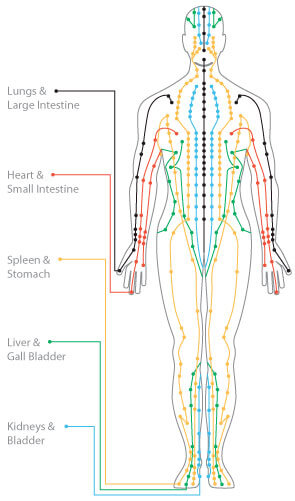Acupuncture
How Does Acupuncture Work?
 Explaining how acupuncture works can be challenging. But it may help if you imagine that your body is wrapped in an electrified web. Every single cell in your body is connected through this web.
Explaining how acupuncture works can be challenging. But it may help if you imagine that your body is wrapped in an electrified web. Every single cell in your body is connected through this web.
However, in order to maintain your health and well being, every cell needs to have unlimited access to the energy that is contained in this web. This web of energy is called “Qi”. Acupuncture theory considers it the life force and healing power of the body.
Acupuncture Relies On the Unrestricted Flow of Qi
If everything is working properly Qi can heal and strengthen every part of you. From organ systems to thoughts and emotions. Problems occur when there is stagnation, or a “traffic jam” in the flow of Qi. Cells that are downstream from the lines that are “jammed up” are unable to perform their tasks.
This results in signals from the body that something is wrong. The most common signal that the body sends is pain, which tells us that there is blockage of Qi. There are other signs, such as digestive issues, poor sleep, hormonal imbalance, elevated blood pressures, vision problems, memory issues, frequent colds, fatigue….the list goes on and on.
We All Have Tangled Qi
We all have tangled energy circuits in different parts of our bodies. And our bodies, in its wisdom, compensates until the load becomes too much to handle. Acupuncture treatments simply disentangle the energy pathways. This allows the innate healing power within your body to stop the pain or correct the problem.
Free Consultation
Call us at: 435-359-1479
Or send us a message below,
we’ll answer all your questions!
Acupuncture Works at the Root of Health Problems
By thinking of acupuncture in this way, you can see why it addresses both the symptoms and the root of health problems. Above all, this allows us to treat a large number of physical and emotional disorders. Because acupuncture can affect the core of your biology, it can treat a full range of health problems in all ages. For example, the prevention and treatment of internal diseases to the elimination of pain and emotional imbalance can successfully respond to Acupuncture treatment.
Acupuncture Has Been in Continual Use for Thousands of Years
There are many reasons why acupuncture has been in continual use for thousands of years. For instance, it is now one of the most widely used forms of medicine in the world. This is because it’s safe, effective, and has very few negative side effects.
Energetic Health is dedicated to providing health care to our patients in a compassionate, unhurried way. We often deliver results when other methods fail. Above all, we strive to provide a caring, healing environment for our patients. This allows our patients to restore their health as quickly as possible.
What Can You Expect?
- One-on-one care
- 30 minutes with the acupuncturist
- More time to discuss needs
- No unwanted noises or distractions
- Customized care
- Coverage by some insurance companies
- Private room
- Choice of recliner or table
- Appointments available 4 days a week
Questions & Answers
Is Acupuncture Safe?
Yes! It has been used for well over 5000 years to help billions of people. The U.S. Food and Drug Administration (FDA) approved acupuncture needles for use by licensed practitioners in 1996 and requires that acupuncturists follow strict safety guidelines: only sterile, nontoxic needles that are labeled for Single Use Only.
Do Acupuncture Needles Hurt?
You can fit close to 10 acupuncture needles inside the tip of one hypodermic needle. Once the needles are inserted, some patients may experience a mild tingling or a sensation of fullness, along with an increased sense of relaxation–no discomfort. Over 80% of patients fall asleep during treatment.
How Many Treatments Will I Need?
Each patient is different. The initial phase of the treatment plan is usually between 4-10 visits. The length of treatment depends on how long the condition has been present and how quickly the patient responds to treatment. Generally, patients with more acute conditions respond faster than those with chronic conditions.
Training & Education
Over 65 acupuncture schools and colleges in the U.S. exist and require postgraduate training programs that range from 3-4 years, including an internship.
Referral Rates
In a study published in the Archives of Internal Medicine, 51% of medical doctors understand the value of acupuncture. Therefore, they are happy to refer patients to acupuncturists.
Military & War Zones
Acupuncture was introduced to the U.S. military during the Vietnam War. Local physicians were allowed to administer acupuncture to Vietnamese patients at a U.S. Army surgical hospital.
Most recently, Col. Richard Niemtzow, an Air Force physician began a program in 2001 termed “battlefield acupuncture.” Air Force, Navy, and Army doctors are taking acupuncture to the war zones of Iraq and Afghanistan. This has become a standard part of emergency care in combat and in front line hospitals.
Are You Suffering?
Some of the conditions that we successfully treat:
- Addictions
- Anxiety
- Arthritis
- Asthma
- Carpal Tunnel Syndrome
- Chronic Fatigue
- Colitis
- Common Cold
- Constipation
- Dental Pain
- Depression
- Diarrhea
- Digestive Trouble
- Dizziness
- Dysentery
- Emotional Problems
- Eye Problems
- Facial palsy/tics
- Fatigue
- Fertility
- Fibromyalgia
- Gingivitis
- Headache
- Hiccup
- Incontinence
- Indigestion
- Irritable Bowel Syndrome
- Low Back Pain
- Menopause
- Menstrual Irregularities
- Migraine
- Morning Sickness
- Nausea
- Osteoarthritis
- Pain
- PMS
- Pneumonia
- Reproductive Problems
- Rhinitis
- Sciatica
- Seasonal Affective Disorder (SAD)
- Shoulder Pain
- Sinusitis
- Sleep Disturbances
- Smoking Cessation
- Sore Throat
- Stress
- Tennis Elbow
- Tonsillitis
- Trigeminal Neuralgia
- Urinary Tract Infections
- Vomiting

